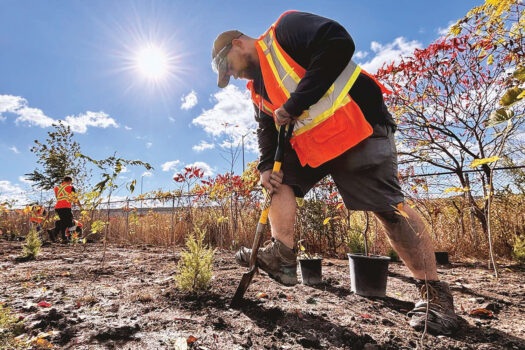A second-year student in the Environmental Landscape Management program at Seneca College’s campus in King City, Ont., David Swaby, 45, has worked various landscape and horticulture jobs over the years in three different countries. Throughout that time, new opportunities have continued to open up through David’s willingness to work hard and to do quality work.
Born and raised in Jamaica, Swaby recalls his mother would plant lots of vegetables and flowers in her many gardens over the years. His grandfather was a farmer. “For as long as I can remember, we were always harvesting fruits from the farm and selling seedlings,” David says. Those would then be sold at market for some extra money. When his grandfather passed away, his mother took over the farm.
Swaby says his love for building things with his hands and working outdoors comes from his father, who worked in construction. Most of all, Swaby says his father taught him that not all people are willing to work hard and do the job right, and that those who do eventually get rewarded. “Always give good quality work to people and give your best always, and the money will come,” Swaby says. “Your reputation is always better than money.”
After graduating high school in Jamaica, Swaby enrolled in a program that got him a co-op placement working maintenance at a hotel. It was there he first realized the many opportunities available in the landscape and horticulture profession.
Working maintenance soon opened up an opportunity on the lawn care crew, followed by a promotion that led to using his propagation skills in a greenhouse.
“Always give good quality work to people and give your best always, and the money will come.
Your reputation is always better than money.”
— David Swaby
Swaby says at the time, hotels were constantly spending money to buy new plants. “I sat down management and told them my vision for the greenhouse area,” Swaby explains, and with the approval to proceed he made some improvements and the hotel then produced most of the plant material they needed themselves.
With some experience under his belt, David followed an opportunity to work at a hotel in the United States. There, he got his driver’s license to fill a need in the lawn care crew and was promoted to irrigation technician based on his plumbing and electrical skills. With computerized irrigation systems, Swaby got his first interaction with computers and was immediately fascinated by them.
Swaby purchased a computer and printer and returned home to Jamaica and set up a family run printing business. After nearly 20 years away from his horticulture roots, Swaby decided to pursue his long-time goal of receiving a formal education in horticulture.
Post-secondary education has been a goal of David’s for some time. “I’ve never gone to college,” he explains, “and with my kids growing up I wanted to show them that they could do the same.”
So in August of 2018 David and his family moved to Canada and the following month he started classes at Seneca. Now in his second year, he says the program is giving him exposure to many things, including construction, hardscaping, carpentry and all kinds of plants. “I’m more interested in the construction side of things,” he says, “and coming from Jamaica, we sometimes have water issues,” so being able to use water effectively and work with native plants are two areas on which he would like to focus.
That passion for native plants landed Swaby a $1,000 scholarship from the Ontario Horticultural Trades Association (Foundation) in 2019. Swaby was awarded the Horst Dickert Memorial Scholarship — for a student with an interest in native plants.
“I’ve come to realize there are a lot of opportunities here,” Swaby says about being in Canada, “and the field is so wide in what you can do. There are so many directions you can go.”
BONUS ONLINE CONTENT:
Follow David’s career in the profession in his own words.
Scholarship applications close June 30
Each year, the Ontario Horticultural Trades Foundation awards over $50,000 in scholarships to high school and post-secondary students across the province. The funding goes to the best and brightest horticulture students who are the future of the profession, and it provides a real boost right when they need it most.
Created in 1979, the Foundation’s mandate is to ensure a healthy future for the horticulture industry through financial support for research and scholarships. With dozens of recipients each year, the foundation makes a major impact on the lives of future green professionals.
Under the Foundation umbrella, the Cullen family scholarship program also sees some $30,000 awarded to students each year.
The deadline to apply for scholarships is June 30. Applying is easy, and generally requires students to send their transcripts and a short essay describing their interest in horticulture. For more information and to apply, visit ohtf.ca.









